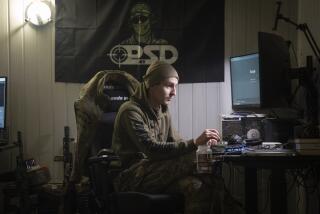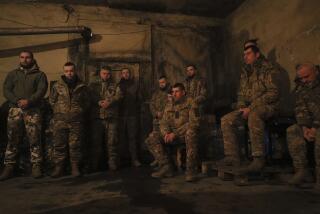Soldiers at Front Lines Want to Start the War : Combat: ‘The time has come,’ troops say. While waiting for the ground offensive, they play cat-and-mouse games with enemy patrols.
WITH U.S. FORCES, Saudi Arabia — As the generals talk optimistically about drawing out the air assault, the grunts at the front chafe and want to start their war.
“We want to get busy,” said Army Sgt. Michael Napier, 27, from Pittsburgh. “We’re tired of giving him (Saddam Hussein) time to get ready. The time has come.”
Similar frustration is voiced by Army Sgt. Michael Cook, 24, who stands within sight of Iraqi soldiers he is forbidden to engage. Instead, the squad he commands has been staging attacks on mock Iraqi positions.
“You’re tired of not doing anything,” said Cook. “You’d rather be at home not doing anything. The boredom eats at your mind.”
Senior field commanders confront the delicate task of defusing these emotions without dampening the spirit or even anger from which they stem. Their basic argument is that the longer the air war goes on, the fewer the infantrymen who will die.
“There is always a chance they will lose their edge, but I personally don’t think they will,” said Lt. Col. David Abrahamson, an Army battalion commander. “I’m extremely confident in their abilities, their training and their morale.”
To some, the command logic makes sense. “The longer they keep bombing, then the easier it will be when we go in to mop up,” said Sgt. Willard Johnson, 27, a medic from Fitzgerald, Ga. “Not everyone’s family will have to deal with a loss.”
But six months in an inhospitable terrain, confronting an enemy of unknown strength, is taking a toll. Nerves are jangled. Urgency slips into anger, and the anger sometimes is misdirected at colleagues.
For five days, the Army’s 1st Infantry Division has skirmished with Iraqi troops over a tiny village on the Saudi-Kuwait border. Iraqi armored troops move in at night to gather information about U.S. positions and vanish before they can be killed.
One night, the two sides exchanged fire across the thin strip of desert separating them. Green tracer rounds fired by the Iraqis streaked over the hunkered-down U.S. troops. They returned fire from their Bradley fighting vehicles and called in a helicopter air strike.
“Nothing like this had happened to any of us,” said Lt. Thomas Karns, 24, of Linesville, Pa., commander of the Bradley platoon. “It got a little hairy. We got a little nervous, scared, whatever you want to call it.”
Some commanders say these small tastes of battle keep soldiers alert and guard against any dulling of their senses.
But some of Karns’ soldiers are tired of the cat-and-mouse game over the village, a collection of ramshackle buildings and mud huts. They want to take it, once and for all.
“They still hold the town because we let them,” complained one a soldier.”We’ve been begging to go forward and clean them out, but I guess the highers have their reasons. It doesn’t feel like a war.”
The nights of tracking the elusive Iraqis in and around the village have left Pvt. Hugh Bohannon, a 20-year-old from Buffalo, N.Y., frustrated and a little angry at his own side.
Bohannon operates a ground-surveillance radar unit monitoring the village. Several nights running, he has picked up evidence of at least two dozen Iraqi vehicles. But when Apache attack helicopters have been dispatched to kill the vehicles, the Iraqis have disappeared.
The pilots claim the soldiers are making mistakes, perhaps confusing wandering camels with armored personnel carriers. The soldiers grouse that the pilots aren’t doing their job.
“Every one of those is an Iraqi target,” insisted Bohannon as he watched the blips on his radar screen. “People don’t have faith in the Apaches. They have the world’s best helicopter and they aren’t doing diddley.”
Another soldier echoed the impatience, boasting: “If those Apaches can’t find the targets, let me know and I’ll shoot them myself.”
The other night, Bohannon and his partner, Sgt. Tarin Hawkins, 27, of San Antonio, detected vehicles on the desert and nearly fired on them from their armored personnel carrier. At the last minute, they discovered it was a clutch of American Bradleys.
“It got ugly that night,” said Bohannon. “It just shows you what it is going to be like when this kicks off. When it hits the fan, there will be lots of friendly fire kills.”
Capt. Michael Bills, 33, of West Springfield, Va., commands a cavalry troop at this outpost. He suspects the Iraqi vehicles are evading the Apaches by hiding in a low area behind the town--or perhaps they are farther back than the radar indicates.
“We’ll get them eventually,” he said. “We are just a few days into this.”
This story was compiled from pool reports and cleared by U.S. military censors.
More to Read
Sign up for Essential California
The most important California stories and recommendations in your inbox every morning.
You may occasionally receive promotional content from the Los Angeles Times.










